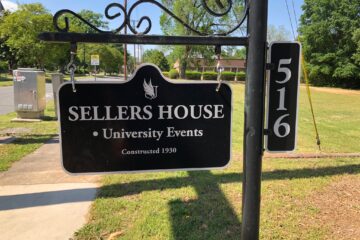Many students and faculty believed Winthrop University would have moved to total remote instruction by now due to COVID-19, yet students remain on campus and in class, with Winthrop’s COVID-19 Dashboard reading, as of Oct. 16, six positive cases amongst students since Oct. 5, zero positive cases amongst employees since Oct. 5, and 37 cumulative positive cases since March 16.
“Our adjustment to the new normal for living and learning has gone well, and I applaud you for your efforts to keep your colleagues and friends safe and healthy… I think our best course of action is to continue in Phase 2 at least through the end of the fall semester,” according to an email sent by Winthrop President George Hynd to students on Oct. 13.
Some people applaud Winthrop’s diligence in upholding safety regulations and their transparency in revealing COVID-19 data, while others question whether the data shown on the dashboard is even reliable. Alexis Stenger, a senior exercise science major who got tested for COVID-19 at the DHEC-sanctioned testing at the coliseum said, “When I got tested, no one asked if I was affiliated with Winthrop and there was nothing I signed saying I was affiliated with Winthrop either.”
Marsha Bollinger, chair of the Department of Interdisciplinary Studies and professor of geology, said that she also received testing at the coliseum and was not asked during any point of the process where she worked.
Both Stenger and Bollinger tested negative for COVID-19, so there was no obligation to report their results to the university, although for students who test positive, the protocol may be different. Either those who test positive are expected to adhere to an honor code in reporting their results to the university, or DHEC reports the results. If COVID-positive people are responsible for reporting their results, the COVID-19 Dashboard numbers might be off if those who test positive are not honest.
“I’m hoping that people are doing the right thing, because we have so much at stake… So my sense is [students] are being very careful about it,” Bollinger said.
Jackie Concodora, director of Winthrop’s Health and Counseling Services, said, “DHEC does not ask people who come to their pop-up sites about affiliations. The testing site at the coliseum is open to the York County community. If a test comes back positive, the epidemiology nurse will ask about employment, school, etc. during the contact tracing process. If a positive person shares that they are affiliated with Winthrop then the epidemiology team will notify the relevant department.”
Therefore, for Winthrop faculty, staff and students who receive COVID-19 testing at the coliseum, only when they test positive are they asked if they are a part of Winthrop, however, not everyone opts to get tested at DHEC pop-up locations.
Seth Shull, a senior art major who tested positive for COVID-19, said, “I got tested at a hospital in Rock Hill…once I tested positive, I sent Winthrop an email saying, ‘Hey, I’m positive. What do I do now?’”
While Shull immediately reported his positive result to the university, there are currently no measures in place to ensure that all Winthrop faculty, staff and students will do the same should they receive testing at other various locations. This can result in some inaccurate data on Winthrop’s COVID-19 Dashboard.
“I feel like Winthrop should mandate at least a test a week for everybody because I know they did that at other colleges and that’s what got them to close those schools and I don’t really want to close down the school, I just would rather have accurate results,” Stenger said. “I’m a very realistic person, very rational person, so to only have [37] people get tested positive over months of being in school, I don’t know if I really believe it, so I would prefer for everybody to get tested because it’s free at the coliseum and it takes 30 seconds.”
The University of South Carolina is mandating COVID-19 testing for students on their campuses.
“For the safety of all of our students, those moving into on-campus housing must show proof of COVID-19 testing and clearance from Student\ Health Services prior to move-in,” according to
SC.edu.
Clemson is also requiring testing for their students.
“As part of Clemson’s plan to promote safe in-person instruction and on-campus activities, the University required all students on its main campus to receive a negative COVID-19 test result prior to returning to the classroom and campus,” according to Clemson.edu.
Currently, Winthrop is not requiring faculty, staff and students to get tested.
Dwight Dimaculangan, chairman of the biology department and professor of biology, said, “I’m glad the school [has the COVID-19 Dashboard] because originally they weren’t going to do that, so I am very happy they’re trying to be as transparent as possible… but I am concerned that they’re basing the data on limited knowledge and so my fear is that they have created a false sense of security about there being hardly any cases on campus, because I’m not sure that that’s the case.”
Due to the fact that Winthrop is not requiring faculty, staff and students to get tested, the numbers on the COVID-19 Dashboard are solely based on the results of those who receive testing upon their own accord. If Winthrop required faculty, staff and students to get tested, the dashboard data would be more reliable.
“The biggest problem is there is no general testing program that’s going on at Winthrop…if you have control over the testing, you can determine how many people are tested overall, how many negative tests there are and how many positive tests there are and that gives you a positivity rate… For instance, in South Carolina, I just saw reported yesterday, there’s over 1,000 new cases in South Carolina…the rate went from 9 percent back up to 12 percent and what the CDC says is you should be really cautious if it’s over 5 percent… I don’t see how [Winthrop] is going to know definitely what the positivity rate is unless they require testing in some form.”
There are many unanswered questions regarding how Winthrop is handling the pandemic. How can one feel secure in the data displayed on the dashboard when Winthrop does not require COVID-19 testing for students, staff and faculty like other South Carolina public institutions do?
Perhaps these questions can be answered by Linda Bell, S.C. State Epidemiologist, during the cultural event, “The Role of Epidemiology in a Pandemic and Public Health Safety,” on Oct. 22 from 7-8:30 p.m. via Zoom.
Graphic by Maggie Claytor




